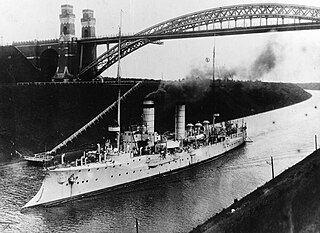See also
- SS Cap Arcona, a passenger liner requisitioned by the Kriegsmarine during World War II
Three cruising vessels of the Prussian Navy and later Imperial German Navy have been named SMS Arcona
Arcona may refer to:
Five ships and a shore establishment of the Royal Navy have been named HMS Mersey after the River Mersey:
Eight ships of the Royal Navy have been named HMS Challenger, most famously the fifth, the survey vessel Challenger that carried the Challenger expedition from 1872 to 1876.
Six Royal Navy ships have been called HMS Hero:
SMS Kaiser has been the name of two ships of the German Imperial Navy:

Eduard Karl Emanuel von Jachmann was the first Vizeadmiral of the Prussian Navy. He entered the navy in the 1840s after initially serving in the merchant marine. In 1848, Jachmann received his first command, the corvette SMS Amazone; through the 1850s and early 1860s, he held several other commands, including the frigates Thetis—aboard which he took part in the Eulenburg expedition to East Asia—and Arcona. During the Second Schleswig War in 1864, he commanded Prussian naval forces in the Baltic from Arcona, and led a small squadron at the Battle of Jasmund on 17 March. Though defeated in that battle, he was promoted to Konteradmiral for his aggressive handling of the Prussian fleet.

SMS Arcona was the ninth member of the ten-ship Gazelle class of light cruisers that were built for the German Kaiserliche Marine in the late 1890s and early 1900s. The Gazelle class was the culmination of earlier unprotected cruiser and aviso designs, combining the best aspects of both types in what became the progenitor of all future light cruisers of the Imperial fleet. Built to be able to serve with the main German fleet and as a colonial cruiser, she was armed with a battery of ten 10.5 cm (4.1 in) guns and a top speed of 21.5 knots. Arcona was a modified version of the basic Gazelle design, with improved armor and additional coal storage for a longer cruising range.
Three ships of the Royal Navy have been named HMS Donegal, after the failed French attempt to land in County Donegal in 1798:

SMS Gazelle was an Arcona-class screw-driven frigate of the Prussian Navy built in the 1850s. The ship was laid down in 1855 at the Royal Dockyard in Danzig, launched on 19 December 1859, completed on 22 May 1861, and commissioned into the Navy almost a year later on 15 May 1862.
In addition to several other ships, two ships of the Imperial German Navy and one ship of the Austro-Hungarian Navy have been named SMS Nautilus, after the Greek word for a sailor.

SMS Arcona was a member of the Carola class of steam corvettes built for the German Kaiserliche Marine in the 1880s. Intended for service in the German colonial empire, the ship was designed with a combination of steam and sail power for extended range, and was equipped with a battery of ten 15-centimeter (5.9 in) guns. Arcona was laid down at the Kaiserliche Werft in Danzig in 1881, she was launched in May 1885, and she was completed in December 1886.
Three ships of the Imperial German Navy and two of the Austro-Hungarian Navy have been named SMS Möwe:
Several ships of the German and Austro-Hungarian Navies have been named SMS Greif
Two ships of the German Imperial Navy were named SMS S17. They were both torpedo boats built by Schichau-Werke.
Two ships of the German Imperial Navy were named SMS S18. They were both torpedo boats built by Schichau-Werke.
SMS S21 refers to two torpedo boats built by the German Kaiserliche Marine :
SMS S22 refers to two torpedo boats built by the German Kaiserliche Marine :
SMS S23 refers to two torpedo boats built by the German Kaiserliche Marine :
Two ships of the German Kaiserliche Marine have been named SMS Friedrich Carl: